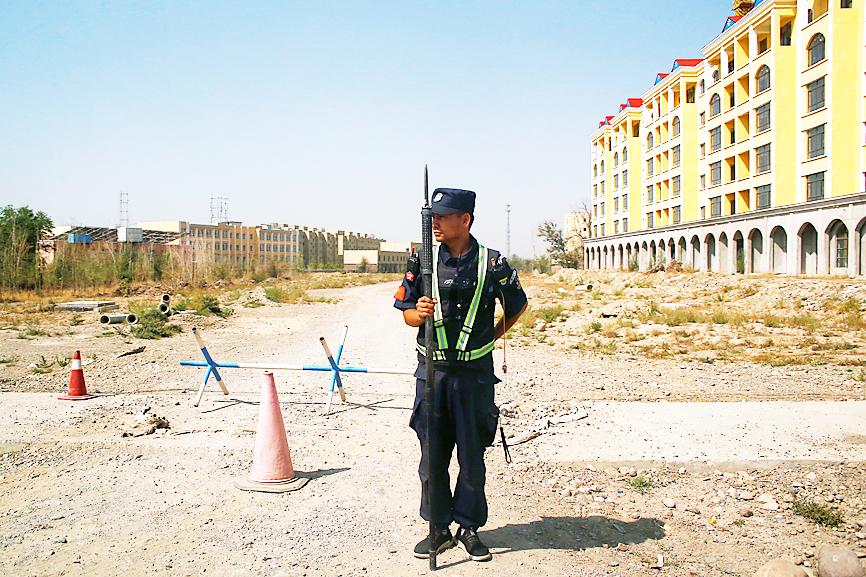Muslims in China’s Xinjiang were “arbitrarily” selected for arrest by a computer program that flagged suspicious behavior, rights campaigners said yesterday, in a report detailing big data’s role in repression in the restive region.
The US-based Human Rights Watch (HRW) said leaked police data that listed more than 2,000 detainees from the Aksu Prefecture was further evidence of “how China’s brutal repression of Xinjiang’s Turkic Muslims is being turbocharged by technology.”
Beijing has come under intense international criticism over its policies in the resource-rich territory, where rights groups say as many as 1 million Uighurs and other mostly Muslim minorities have been held in internment camps.

Photo: Reuters
China defends the facilities as vocational training centers aimed at stamping out terrorism and improving employment opportunities.
Surveillance spending in Xinjiang has ballooned in the past few years, with facial recognition, iris scanners, DNA collection and artificial intelligence deployed across the region in the name of preventing terrorism.
HRW said it had obtained the list — which detailed detentions from mid-2016 to late 2018 — from an anonymous source that had previously provided audiovisual content taken from inside a facility in Aksu.
The group gave an example of a “Mrs T” — detained for “links with sensitive countries” — who was listed as having received a number of calls from a foreign number that belonged to her sister.
HRW researchers spoke to the woman and learned that police had interrogated her sister in Xinjiang, but she has had no direct contact with her family in the region since.
The people were flagged using a program called the Integrated Joint Operations Platform, which collected data from surveillance systems in Xinjiang, before officials decided whether to send them to camps, HRW said.
The group said its research suggests the “vast majority” of people were flagged to authorities for legal behavior, including phone calls to relatives abroad, having no fixed address or switching off their phone repeatedly.
Only about 10 percent of the people on the list were detained for terrorism or extremism.
The list, parts of which were shown to reporters, described the reason for detention of many of the people as simply being “flagged” by the integrated platform.
HRW has not published the full contents of the list, citing safety concerns for the whistle-blower.
Chinese Ministry of Foreign Affairs spokesman Zhao Lijian (趙立堅) yesterday accused HRW of “stirring up trouble,” saying the report was “not worth refuting.”
Separately, US-based surveillance research firm IPVM said in a report on Tuesday that Chinese telecoms giant Huawei Technologies Co (華為) had been involved in testing facial recognition software that could send alerts to police when it recognized Uighur minorities’ faces.
An internal Huawei report cited by IPVM — which has been removed from the company’s Website, but is still visible in Google searches — showed the software as passing tests for “Uighur alerts” and “recognition based on age, sex, ethnicity, angle of facial images.”
Huawei yesterday said that the program “has not seen real-world application” and that it “only supplies general-purpose products for this kind of testing.”

DAREDEVIL: Honnold said it had always been a dream of his to climb Taipei 101, while a Netflix producer said the skyscraper was ‘a real icon of this country’ US climber Alex Honnold yesterday took on Taiwan’s tallest building, becoming the first person to scale Taipei 101 without a rope, harness or safety net. Hundreds of spectators gathered at the base of the 101-story skyscraper to watch Honnold, 40, embark on his daredevil feat, which was also broadcast live on Netflix. Dressed in a red T-shirt and yellow custom-made climbing shoes, Honnold swiftly moved up the southeast face of the glass and steel building. At one point, he stepped onto a platform midway up to wave down at fans and onlookers who were taking photos. People watching from inside

A Vietnamese migrant worker yesterday won NT$12 million (US$379,627) on a Lunar New Year scratch card in Kaohsiung as part of Taiwan Lottery Co’s (台灣彩券) “NT$12 Million Grand Fortune” (1200萬大吉利) game. The man was the first top-prize winner of the new game launched on Jan. 6 to mark the Lunar New Year. Three Vietnamese migrant workers visited a Taiwan Lottery shop on Xinyue Street in Kaohsiung’s Gangshan District (崗山), a store representative said. The player bought multiple tickets and, after winning nothing, held the final lottery ticket in one hand and rubbed the store’s statue of the Maitreya Buddha’s belly with the other,

‘NATO-PLUS’: ‘Our strategic partners in the Indo-Pacific are facing increasing aggression by the Chinese Communist Party,’ US Representative Rob Wittman said The US House of Representatives on Monday released its version of the Consolidated Appropriations Act, which includes US$1.15 billion to support security cooperation with Taiwan. The omnibus act, covering US$1.2 trillion of spending, allocates US$1 billion for the Taiwan Security Cooperation Initiative, as well as US$150 million for the replacement of defense articles and reimbursement of defense services provided to Taiwan. The fund allocations were based on the US National Defense Authorization Act for fiscal 2026 that was passed by the US Congress last month and authorized up to US$1 billion to the US Defense Security Cooperation Agency in support of the

‘COMMITTED TO DETERRENCE’: Washington would stand by its allies, but it can only help as much as countries help themselves, Raymond Greene said The US is committed to deterrence in the first island chain, but it should not bear the burden alone, as “freedom is not free,” American Institute in Taiwan Director Raymond Greene said in a speech at the Institute for National Defense and Security Research’s “Strengthening Resilience: Defense as the Engine of Development” seminar in Taipei yesterday. In the speech, titled “Investing Together and a Secure and Prosperous Future,” Greene highlighted the contributions of US President Donald Trump’s administration to Taiwan’s defense efforts, including the establishment of supply chains for drones and autonomous systems, offers of security assistance and the expansion of